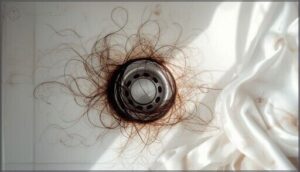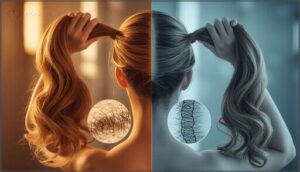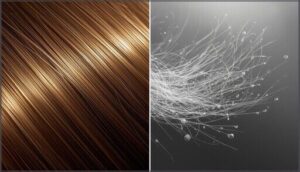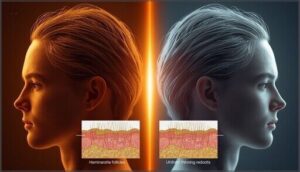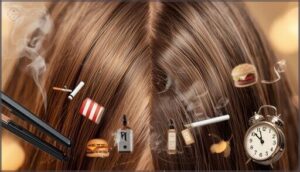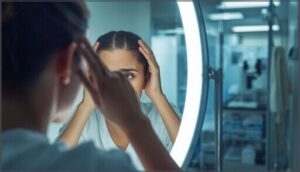This site is supported by our readers. We may earn a commission, at no cost to you, if you purchase through links.
Your hairline doesn’t retreat overnight, but the reality hits when your ponytail suddenly feels thinner or your part looks wider than it did six months ago. Hair thinning affects roughly 50% of men and 25% of women by age 50, yet most people miss the earliest warning signs until significant miniaturization has already occurred.
The culprits range from genetic predisposition and hormonal shifts to everyday styling choices that steadily weaken follicles. Understanding what makes your hair thin—whether it’s an overactive thyroid, aggressive heat tools, or inherited androgen sensitivity—gives you the clarity to intervene before minor shedding becomes permanent damage.
The good news: targeted prevention strategies can protect your density and restore resilience when you catch the problem early.
Table Of Contents
- Key Takeaways
- What Causes Hair to Thin?
- How Does Hair Thinning Present?
- Why Does Hair Thinning Differ by Gender?
- What Medical Conditions Cause Hair Thinning?
- Can Lifestyle Choices Make Hair Thin?
- How Can You Prevent Thinning Hair?
- When Should You Seek Professional Help?
- Frequently Asked Questions (FAQs)
- Conclusion
Key Takeaways
- Hair thinning affects roughly 50% of men and 25% of women by age 50, driven by genetic predisposition, hormonal shifts (especially DHT sensitivity), and lifestyle factors like heat styling or nutritional deficiencies—but catching miniaturization early unlocks targeted prevention strategies that can protect density and restore resilience.
- Gender determines distinct thinning patterns: men typically experience receding hairlines and crown thinning from androgenetic alopecia, while women face diffuse shedding across the crown due to estrogen decline, PCOS, or thyroid dysfunction—with hormonal imbalances accounting for 15–30% increases in shedding rates.
- Medical conditions including thyroid disorders, autoimmune diseases like alopecia areata, scalp infections, and chronic illnesses can trigger hair loss independent of genetics, requiring professional evaluation when you notice sudden patchy loss, persistent thinning despite gentle care, or accompanying symptoms like fatigue or weight changes.
- Prevention centers on gentle hair care routines (sulfate-free products, minimal heat exposure below 302°F, wide-tooth combs), balanced nutrition addressing iron, vitamin D, zinc, and biotin deficiencies, and stress management—while medical interventions like minoxidil, finasteride, PRP injections, or laser therapy offer evidence-based regrowth options when lifestyle changes aren’t enough.
What Causes Hair to Thin?
Hair thinning doesn’t happen for just one reason—your body, habits, and even your genes all play a part. Understanding what’s behind your thinning hair gives you the power to tackle it head-on.
Let’s break down the main culprits you need to know about.
Genetic Factors
Your genes can throw you a curveball regarding hair health. Hereditary traits—like variants in the androgen receptor gene—dramatically increase your risk for androgenetic alopecia, with family history doubling or tripling early-onset thinning odds. DNA analysis reveals multiple genetic factors influencing follicular miniaturization. If alopecia runs in your family, you’re facing a genetic predisposition that’s tough to outsmart without targeted intervention.
Understanding web server issues can also help in identifying potential problems with online health resources.
Aging and Hair Health
Time doesn’t just add lines to your face—it reshapes your hair follicle decline too. After 50, dermal papilla cells slow down, shortening your anagen phase and reducing hair shaft production.
You’ll notice scalp microcirculation drops, cutting nutrient delivery to follicles. Your telogen phase stretches longer, meaning finer regrowth and more shedding.
Age also cranks up hormone sensitivity, especially to DHT, accelerating thinning patterns you can’t ignore. Understanding AP study resources can help individuals better cope with stress related to hair thinning.
Hormonal Imbalances
Your body’s hormone regulation can turn hair follicles on or off faster than any styling tool. Thyroid balance, androgen effects, and estrogen role all dictate DHT conversion—that’s the hormone shrinking your follicles. Hormonal imbalance and hair loss connect through:
- PCOS androgens triggering miniaturization in 6–20% of women
- Thyroid dysfunction spiking shedding rates 15–30%
- Postpartum hormone changes affecting 40–50% of new mothers
- Menopause estrogen drops accelerating thinning patterns
- Androgen receptor intensity driving hereditary loss severity
Hormonal influence on hair isn’t subtle—it rewires your growth cycle entirely.
Medical Conditions
Beyond hormonal imbalance lies a larger culprit: medical conditions that silently dismantle your strands. Thyroid issues, affecting roughly 4.6% of adults, can lead to significant hair changes. Hypothyroidism, in particular, may trigger 15–30% more shedding. Autoimmune diseases like alopecia areata strike 0.2–0.5% of people, creating patchy bald spots. Scalp infections, chronic illnesses, and medication side effects also contribute to thinning hair. Your dermatologist can pinpoint which condition is attacking your follicles.
| Medical Conditions | Impact on Hair |
|---|---|
| Thyroid disorders | Diffuse shedding, slow regrowth |
| Autoimmune diseases | Patchy loss, possible scarring |
| Scalp infections | Inflammation, temporary thinning |
Stress and Emotional Factors
Anxiety can sabotage your scalp before you realize it. Stress elevates cortisol, which suppresses hair follicle activity and may shrink hair diameter by 5–15% over months. Telogen effluvium—sudden, stress-triggered shedding—affects up to half of stressed adults within 3–6 months.
- Emotional Triggers: Depression and anxiety raise shedding scores in 25–35% of dermatology patients.
- Hormonal Imbalance: Chronic stress disrupts androgen signaling, accelerating miniaturization.
- Mindful Coping: Stress management improves hair fullness by 10–25% within six months.
Nutritional Deficiencies
Malnutrition starves your follicles of fuel. Iron deficiency disrupts shedding cycles in 1.62 billion people worldwide, while zinc supplements reverse hair loss in deficient patients. Vitamin D correlates with androgenetic alopecia, and protein malnutrition thins shafts noticeably.
Malnutrition starves follicles of iron, zinc, vitamin D, and protein—nutrient deficiencies that trigger hair loss in billions worldwide
Fatty acids—especially omega-3—strengthen hair structure, preventing breakage. Correcting vitamin deficiencies through dietary supplements often restores hair density within months.
Lifestyle and Hair Care Habits
You’re likely sabotaging your scalp without realizing it. Aggressive heat-styling affects 58% of frequent users with increased shedding, while harsh sulfates irritate 42% of adults—yet switching to gentle shampoos improved density in 31% after six months.
Stress-induced pulling, tight hairstyles, and skipping scalp massages starve follicles of circulation.
Regular trimming techniques, nourishing hair masks, and protective hair oils restore scalp health and support sustainable hair growth.
How Does Hair Thinning Present?
Hair thinning doesn’t always announce itself with dramatic shedding—sometimes the signs are subtle and easy to miss. You might notice your scalp showing through in new places, or find yourself wrapping your hair tie around your ponytail one extra time.
Here’s what to watch for as hair begins to thin.
Visible Scalp or Widening Part
One of the earliest signs you’ll notice is your part getting wider—in fact, 37% of women report this within a year of noticing increased shedding. You may also see more scalp exposure through your hair.
This happens because hair density drops and thinning patterns progress, often before you realize hair loss is underway. Androgenetic alopecia frequently causes this scalp visibility, signaling a need to assess your scalp health.
Increased Hair Shedding
Shedding 50 to 100 strands daily is normal—but if you’re seeing clumps in the shower drain or on your pillow, something’s shifted. Increased hair shedding often signals telogen effluvium, hormonal fluctuations, or nutrient deficiencies triggering your follicles to release more hair than usual.
Three patterns to watch:
- Post-stress shedding – peaks 2–3 months after illness or emotional upheaval
- Postpartum loss – surges 2–4 months after delivery, then usually resolves
- Medication-related thinning – tied to blood thinners, thyroid drugs, or hormonal treatments
Thinner Ponytail or Hairline
Your ponytail diameter shrinking by 10–25% or your hairline creeping backward isn’t paranoia—it’s follicle miniaturization in action. About 30–50% of men with genetic hair loss patterns show frontotemporal recession by midlife, while women notice diffuse thinning along the part.
These hair growth cycles shorten, pushing more follicles into early rest phases and accelerating alopecia. Catching scalp health changes early unlocks better thinning prevention strategies.
Changes in Hair Texture
Texture shifts signal more than cosmetic annoyance—they reveal keratin structure breakdown and compromised cuticle integrity. Your coarse strands turning silky or wispy happens when hair follicle health declines, shrinking fiber thickness by 15–40%. About 28% of people notice this alongside thinning.
Those platinum-fine hairs break easier during styling, accelerating visible alopecia. Watch for softening textures—they’re your scalp’s early warning system for deeper hair growth disruptions.
Patchy or Diffuse Thinning
Hair loss patterns fall into two categories: patchy or diffuse thinning. Patchy hair thinning—like alopecia areata affecting 2% of people—creates distinct bald spots on your scalp, while diffuse thinning scatters miniaturization across broad areas.
About 60–70% of female thinning hair cases show diffuse patterns, making scalp health monitoring through your part width essential for catching follicle care issues early.
Why Does Hair Thinning Differ by Gender?
Hair thinning doesn’t follow the same script for everyone—your gender plays a real role in where and how it happens. Men and women experience different patterns, largely because of how hormones interact with hair follicles.
Let’s break down what makes these patterns distinct and why they show up differently in men versus women.
Male Pattern Hair Thinning
Androgenetic alopecia—the clinical term for male pattern hair thinning—stems from hair loss genetics and androgenetic factors that make your scalp sensitive to DHT, a hormone derived from testosterone.
You’ll usually notice thinning prevention becomes harder as your hairline recedes and your crown thins.
Scalp health management and male hair care routines can’t reverse genetics, but they slow visible progression when hormonal changes drive follicular miniaturization.
Female Pattern Hair Thinning
Women experience a distinct thinning pattern: diffuse shedding across the crown while your frontal hairline stays mostly intact. Genetics and hormonal changes—especially estrogen decline during menopause—drive follicle miniaturization process, shrinking hair shafts over years. Trichoscopy analysis reveals reduced density and caliber.
Hormone therapy, topical minoxidil, and nutritional support can slow female alopecia when hormonal imbalance or metabolic factors accelerate hair loss.
Hormonal Influences in Men and Women
Hormone balance governs your follicle function differently by sex. DHT sensitivity drives androgenetic alopecia in roughly 50% of men by age 50, targeting temples and crown. Women face diffuse thinning from estrogen decline during menopause symptoms, androgen effects in PCOS, or postpartum shifts.
Key hormonal imbalance triggers:
- DHT miniaturizes follicles in pattern thinning
- Estrogen loss accelerates shedding postmenopause
- Thyroid impact disrupts growth cycles
- Prolactin elevations increase hair loss
- Insulin resistance amplifies androgen-driven thinning
Hormone changes alter follicle cycling, explaining sex-specific patterns.
What Medical Conditions Cause Hair Thinning?
Hair thinning isn’t always about genetics or aging—sometimes it’s your body waving a red flag about something deeper.
Medical conditions can disrupt your hair’s growth cycle, triggering shedding or preventing new strands from forming properly.
Let’s look at the specific health issues that might be behind your thinning hair.
Thyroid Disorders
Your thyroid gland acts like a thermostat for your hair follicles—when it’s off, thinning accelerates. Hypothyroid symptoms often include diffuse hair loss, affecting up to 40% of untreated patients.
Low thyroid hormones disrupt normal growth cycles, pushing more strands into shedding phases. Fortunately, thyroid medication usually restores hair regrowth within three to six months once hormonal imbalance normalizes.
Autoimmune Diseases (e.g., Alopecia Areata)
Your immune system may betray your follicles when autoimmune diseases strike. Alopecia areata creates smooth, coin-sized bald patches as T-cells mistakenly attack hair roots during growth phases. This autoimmune response affects roughly 1-2% of people, often appearing in your teens or twenties.
A dermatologist can diagnose these alopecia symptoms through clinical exam—and targeted treatments like corticosteroid injections trigger hair regrowth in 60-80% of localized cases within months.
Scalp Infections
Tinea capitis and bacterial diseases can quietly sabotage your scalp health, causing patchy thinning that won’t resolve without targeted intervention. Fungal infections—especially dermatophyte infections like ringworm—demand swift ringworm treatment with antifungal therapy to prevent permanent damage.
Scalp folliculitis and other dermatological conditions require a dermatologist’s exam to distinguish bacterial from fungal culprits. Early scalp treatment protects your follicles from scarring alopecia and restores normal growth cycles.
Chronic Illness and Medication Effects
Chronic disease and medication side effects often ambush your hair without warning. Chemotherapy, anticoagulants, beta-blockers, and certain antidepressants can trigger diffuse shedding through drug interactions that disrupt your normal growth cycle. A dermatologist can evaluate illness impact and treatment effects on hormonal imbalance and hair loss:
- Diabetes and kidney disease increase telogen effluvium risk
- Chemotherapy causes rapid, extensive shedding
- Retinoids and proton pump inhibitors may trigger thinning
- Medical conditions and hair loss often improve when treatment stabilizes
Can Lifestyle Choices Make Hair Thin?
Your daily habits can absolutely contribute to hair thinning—sometimes in ways you wouldn’t expect. The products you use, how you style your hair, and even what you eat all play a role in keeping your strands healthy or pushing them toward breakage and loss.
Let’s look at the specific lifestyle factors that might be working against your hair.
Overprocessing and Heat Styling
Think of your flat iron as a tiny oven pressed directly onto each strand—heat styling can reduce your hair’s tensile strength by up to 20% after six months of daily use. Chemical processing, like perms or relaxers, doubles your breakage rate within weeks. Hair damage from thermal exposure and chemical treatments creates a direct path to hair thinning and excessive hair fall.
| Heat Damage Factor | Impact on Hair Health |
|---|---|
| Daily blow-drying >450°F | 15–25% loss of elasticity |
| Weekly flat iron use (6 mo) | 12–18% diameter decrease |
| Chemical relaxers/perms | 2–3× higher breakage rate |
| Repeated bleaching | 30–50% more cuticle disruption |
To protect your hair growth, limit heat to ≤165°C and use it only once or twice weekly. Air-dry your hair 80–100% before styling tools touch it—this simple shift cuts breakage by 10–18% over three months. Heat protection sprays with polymer-based formulas reduce cuticle damage by about 15–25%. Weekly protein-rich conditioning masks maintain shaft integrity and visibly reduce hair thinning by 8–12%.
Use of Harsh Hair Products
Beyond heat, your daily shampoo and styling gels can also sabotage hair health. Harsh chemicals like sulfates boost breakage risk by 30%, while alcohol-based products strip 15–25% of strand moisture. Scalp irritation from fragrances and preservatives triggers scratching that accelerates hair loss.
Switch to gentle alternatives—sulfate-free, fragrance-free formulas—and you’ll notice less scalp irritation and stabilized hair thinning within 3–6 months.
Poor Diet and Vitamin Deficiency
What you eat matters just as much as what you avoid. Vitamin deficits—especially iron, vitamin D, zinc, and biotin—trigger hair thinning in up to 40% of certain groups. Malabsorption issues and nutrient imbalance from poor dietary factors silently starve your follicles.
You’ll see deficiency symptoms like brittle strands and increased shedding. Prioritize balanced nutrition, and hair growth promotion follows naturally.
Smoking and Environmental Toxins
Smoking constricts blood flow to your scalp, boosting thinning risk by 28% in current smokers. Toxic air pollution and chemical exposure from solvents or heavy metals add another layer—urban dwellers face dose-dependent hair loss from PM2.5 particles.
Toxin accumulation triggers oxidative stress and inflammation, worsening genetic and stress-related causes of thinning hair. Quit smoking and limit environmental hazards to protect your follicles.
How Can You Prevent Thinning Hair?
You don’t have to stand by and watch your hair thin—there are real steps you can take to protect what you have. Prevention comes down to treating your hair gently, feeding your body the right nutrients, and addressing the stressors that trigger excess shedding.
Here’s what actually works to keep your hair healthy and full.
Gentle Hair Care Routines
Your hair deserves the same kindness you’d show fragile silk. Start with sulfate-free, gentle shampoos to cut scalp irritation by 18% and maintain strand integrity.
Follow these essentials:
- Condition daily—cuts breakage by 22%
- Wide-tooth combs on wet hair reduce damage by 15%
- Apply hair oils and scalp massage 4–5 minutes daily
- Use heat-protectant products or limit styling to 302°F
- Choose satin pillowcases to decrease friction-induced hair loss
These hair care routines protect against hair thinning while supporting hair growth.
Balanced Nutrition for Hair Health
Your follicles depend on proper fuel. Nutrient deficiency—especially iron intake below 70 mcg/dL and low vitamin D—triggers telogen effluvium and disrupts hair growth cycles.
Biotin benefits include strengthening keratin, while zinc aids scalp health.
A healthy diet rich in leafy greens, salmon, eggs, and legumes remedies vitamin deficiencies better than random vitamin supplements. Nutrition and hair growth connect directly through hair care and maintenance practices.
Managing Stress Levels
Chronic stress floods your body with cortisol, triggering telogen effluvium and diffuse hair thinning within weeks. Stress reduction through mindfulness techniques and relaxation methods isn’t optional—it’s essential for emotional wellness and cortisol management.
Combat stress and hair loss with these proven approaches:
- Practice daily meditation or deep breathing exercises
- Maintain 7-8 hours of quality sleep nightly
- Exercise regularly to lower cortisol naturally
- Limit caffeine and alcohol consumption
- Seek therapy or counseling when overwhelmed
Avoiding Damaging Treatments
You’re tempting fate every time you reach for chemical treatments or heat styling tools—overprocessing trashes your hair shaft integrity by 10–15%.
Chemical-free products and natural shampoos protect your follicles from harsh detergents, while hair dye alternatives spare you from sulfate-induced breakage.
Skip the flat iron. Embrace gentle styling and weekly hair mask benefits instead—your thinning hair will thank you.
When Should You Seek Professional Help?
You don’t have to tough it out alone when hair thinning becomes concerning. Knowing when to reach out to a dermatologist or healthcare provider can make the difference between reversing the issue and watching it progress.
Here are the key situations that signal it’s time to get professional eyes on your scalp.
Sudden or Patchy Hair Loss
When thinning strikes in patches or happens overnight, don’t brush it off. Conditions like Alopecia Areata, Telogen Effluvium, or Traction Alopecia demand prompt evaluation to protect your Scalp Health and prevent progression of Hair Loss.
Watch for:
- Coin-sized bald spots appearing within days or weeks
- Excessive Hair Shedding after illness, surgery, or major stress
- Scalp irritation, redness, or flaking alongside Patchy Loss
- Rapid thinning that doesn’t match typical Androgenetic Alopecia patterns
Early Alopecia Treatment preserves follicles you can’t afford to lose.
Underlying Health Symptoms
Sometimes your hair acts as a red flag for deeper problems. If you’re noticing thinning alongside fatigue or weight changes, suspect Thyroid Issues or Iron Deficiency—22% of diffuse thinning traces back to low iron alone.
Unexplained shedding with joint pain or skin changes may signal Autoimmune Diseases like Alopecia Areata.
Don’t ignore Scalp Infections, Hormonal Imbalances, or Vitamin Deficiencies—your body’s trying to tell you something.
Persistent Thinning Despite Care
You’ve tried gentle routines, balanced nutrition, and stress management—yet your scalp health isn’t improving. When follicle care and lifestyle fixes don’t stop persistent thinning, it’s time to see a specialist.
Thinning patterns that worsen despite intervention may point to undiagnosed genetics, hormonal shifts, or underlying conditions requiring medical hair restoration. Don’t wait—early professional evaluation gives you the best shot at effective hair regrowth and long-term hair growth and restoration.
Available Medical and Dermatological Treatments
When lifestyle changes fall short, medical interventions step in. Minoxidil therapy (Rogaine) boosts regrowth in 40–60% of users, while finasteride treatment (Propecia) stabilizes loss in roughly 80% of men.
Your dermatologist may also suggest laser hair growth devices, PRP injections, or scalp massage to stimulate follicles. These evidence-based options give you real control over thinning.
Frequently Asked Questions (FAQs)
What treatments are most effective for thinning hair?
Like Samson reclaiming his strength, you can restore your hair’s vitality. Minoxidil therapy, PRP injections, laser treatment, and nutraceutical supplements offer proven hair growth treatment options, while hair transplant procedures provide lasting hair restoration methods.
Can hair thinning be reversed naturally at home?
Natural remedies like scalp health improvements and gentle hair care can slow thinning, but full hair regrowth at home is uncommon.
Most cases stabilize rather than reverse without medical treatments targeting follicle stimulation.
How long does it take to regrow hair?
Regrowth timelines depend on your hair cycle and the cause of hair loss. Most people see initial hair growth within 3–6 months with treatments like minoxidil, though full recovery often takes longer.
Are there specific vitamins that promote hair growth?
Yes, but only if you’re deficient. Biotin, vitamin D, iron, and zinc can improve hair thickness when levels are low.
Nutrient balance matters most—excessive supplementation won’t speed growth in well-nourished individuals.
Does wearing hats or tight hairstyles cause thinning?
Tight hairstyles can trigger traction alopecia by pulling on hair follicles, especially around your hairline and temples.
Hat pressure rarely causes hair loss, but prolonged tension from braids or ponytails risks scalp health and increases hair thinning over time.
Conclusion
Think of your follicles like vinyl records—once the grooves wear down, the music fades. What makes your hair thin rarely announces itself with fanfare; it whispers through subtle shifts in texture, density, and resilience. You’ve mapped the triggers, from hormonal surges to heat damage.
Now you hold the blueprint: nourish strategically, handle gently, and intervene early. Your scalp isn’t staging a rebellion—it’s sending a signal. Answer it before thinning becomes permanent.
- https://www.ncbi.nlm.nih.gov/books/NBK481583/
- https://hbculifestyle.com/research-paper-topics-50-ideas/
- https://weillcornell.org/jack-levy-md
- https://my.clevelandclinic.org/health/diseases/16921-hair-loss-in-women
- https://nyulangone.org/doctors/1497981948/kristen-lo-sicco?cid=sem_google&sem_campaign_id=21861888952&sem_ad_group_id=168861356799&sem_creative_id=719309514956&gad_source=1&gad_campaignid=21861888952&gbraid=0AAAAAC9qk2v8f2nXVTDRmcSJ9imBSIg5i&gclid=CjwKCAjwxfjGBhAUEiwAKWPwDgcXAU70-oo5ePeuNyNxmavPsAtB-uDr8RWCCzYkVstUBSlYdbpCJhoC0W0QAvD_BwE



